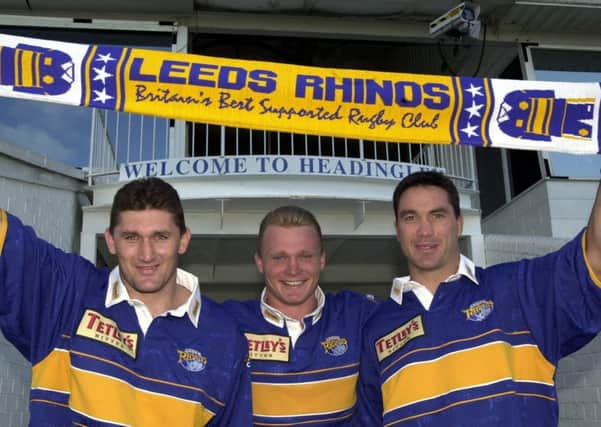On This Day: Rhinos' Clyde failed to show his world-class skills at Headingley


It was on this day 17 years ago that the West Yorkshire club announced the formidable New South Wales State of Origin loose forward would be joining them for the following season.
One of the finest players of his generation, a footballing back-row who packed plenty of punch, too, Clyde had already won most honours in the sport before heading over to the UK.
Advertisement
Hide AdAdvertisement
Hide AdWhile still only 19, he claimed the Clive Churchill Medal as man of the match in Canberra Raiders’ 1989 Grand Final win, playing alongside fellow greats like Mal Meninga and Ricky Stuart.
Clyde played in the defeated 1991 side but claimed man-of-the-match again before lifting his second premiership with Canberra in 1994.
Unfortunately, there was no such success following his switch to Super League after the move turned sour.
Leeds never saw the best of the Canberra legend who was beset by injury problems and only managed 15 games during his solitary season in blue and amber.
Advertisement
Hide AdAdvertisement
Hide AdThere was flashes of his repertoire at times but they were all too fleeting.
It was a shame for all parties; Rhinos wanted him to help build on their 1999 Challenge Cup success and bring them the experience required to secure a first league title since 1972 while Clyde wanted to sign off his glittering career in style.
However, at the age of just 31, and at the end of his first season, it emerged he would not play anywhere again, his career curtailed by Achilles tendon issues which saw him released halfway through a two-year deal.
That said, fellow loose forward Kevin Sinfield, who was just 20 at the time, said Clyde was a “great” influence on him during the Kangaroos’ brief stay and he did help a raft of the club’s youngsters develop.
Advertisement
Hide AdAdvertisement
Hide AdIt was a particularly troublesome time for Leeds’s recruitment, though, given the club’s two other Australian signings also failed to spark.
Head coach Dean Lance had taken over from Graham Murray in 2000 and, having played alongside Clyde at Canberra, used his links to attract the player over from Canterbury Bulldogs where he spent two seasons due to salary cap constraints at Raiders.
But Lance also used his Canberra connections to secure Brett Mullins, the rangy full-back who played alongside Clyde for Raiders, New South Wales and the Kangaroos.
Frustratingly, though, he arrived to feature even fewer times than Clyde, making just 12 appearances in 2001.
Advertisement
Hide AdAdvertisement
Hide AdFurthermore, Lance saw his contract terminated by “mutual consent” just four league games into his second season, departing in April after a run of three successive defeats including a Challenge Cup semi-final loss.
It was hardly ideal news for Clyde and Mullins given their close links with the coach whose difficult reign had also earlier seen him found guilty by an industrial tribunal of discrimination against Leeds winger Paul Sterling.
The third Aussie captured was Robbie Mears who, though less-heralded than his two fellow countrymen, was actually the most successful signing.
That is all relative, mind; the hooker, who arrived from Auckland Warriors, still did not have it easy either. He fractured his collarbone on debut and had his house burgled four times during his single campaign there.
Advertisement
Hide AdAdvertisement
Hide AdMears was good when on the field, though, making 23 Super League appearances for the Rhinos and being awarded the supporters’ player of the year award.
Nevertheless, just like Clyde and Mullins, he would not return for a second year.
In the final game of the 2001 campaign he suffered a badly fractured cheekbone after a high tackle by Sonny Nickle, the St Helens and Great Britain second-row who was banned for nine games as a result.
Mears was later awarded damages after a lawsuit but, aggrieved with how the whole matter was handled, left Rhinos at the end of the season to join Wests Tigers.
At the age of 30, the ex-Canterbury hooker did return to Super League for a brief spell with Leigh Centurions in 2005.
But that, too, ended badly with his club relegated.